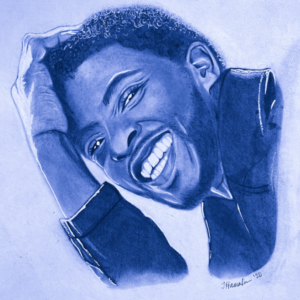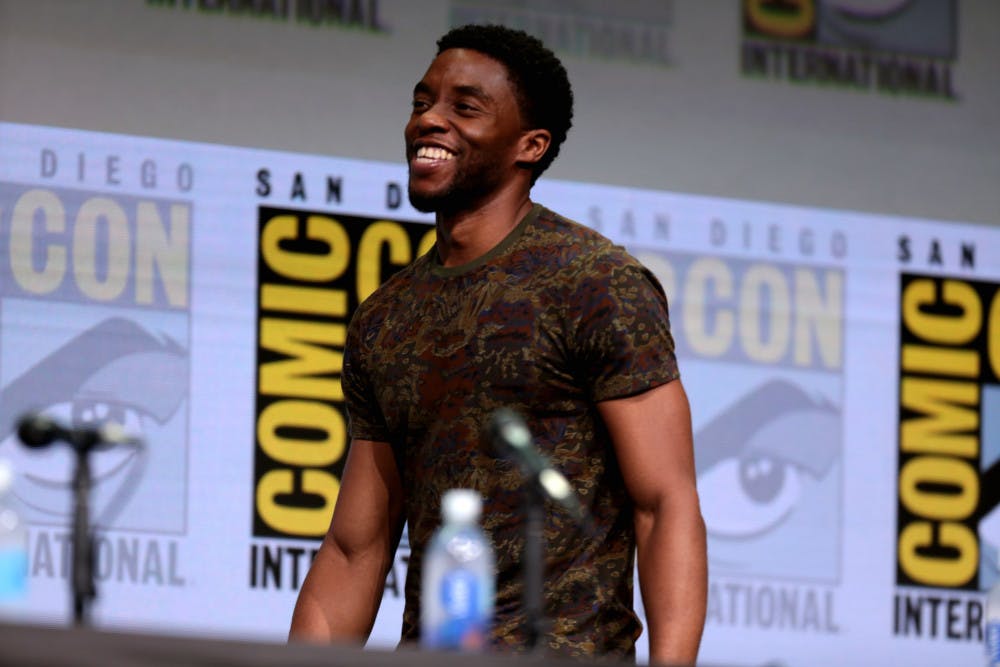By Elliott Nguyen
Correspondent
The world mourned the unexpected death of actor and activist Chadwick Boseman on Friday, Aug. 28. Known for such iconic roles as Jackie Robinson in “42,” James Brown in “Get on Up” and T’Challa in “Black Panther,” Boseman continued to work through his private battle with colon cancer since his diagnosis in 2016.
Chadwick Aaron Boseman was born Nov. 29, 1976, to Leroy and Carolyn Boseman in South Carolina, where he was raised. He had acting experience early in his life — in an interview with Josh Eells of Rolling Stone Magazine in 2018, he describes writing and performing his first play, “Crossroads,” in high school as a tribute to a teammate who was shot and killed.
In 2000, he graduated from Howard University with a Bachelor of Fine Arts in directing. He would go on to win such awards as the MTV Awards’ “Best Performance in a Movie” and “Best Hero” in 2018 for his role in “Black Panther.” In 2019 he won the BET Awards’ “Best Actor” for “Marshall” and “Black Panther,” and the NAACP Image Awards’ “Outstanding Actor in a Motion Picture” for “Black Panther.”

In 2016 he was diagnosed with Stage 3 colon cancer, but opted to keep the diagnosis private. It was not until his death that his illness was revealed. Despite his diagnosis he continued acting, starring in “Black Panther” along with films like “Avengers: Infinity War,” “Avengers: Endgame,” “21 Bridges” and Spike Lee’s “Da 5 Bloods.”
Many of Boseman’s peers expressed their grief when the news broke of his passing. Denzel Washington, who once paid for Boseman’s tuition to the British American Drama Academy’s Midsummer program, said in a statement to CNN, “He was a gentle soul and a brilliant artist, who will stay with us for eternity through his iconic performances over his short yet illustrious career … God bless Chadwick Boseman.”
Black Panther co-star Letitia Wright posted a five-minute video tribute to Instagram, composed of a spoken-word poem saying goodbye to the late star, followed by a video clip of them together in addition to several pictures.
The grief did not evade members of the College community. McKenna Samson, a senior English and African American Studies double major, spoke in an interview with The Signal about the impact Boseman had on her.
“I definitely feel like … when Black Panther came out, it gave us a sense of pride … My brother was in middle school at the time Black Panther came out. It made (children) feel like, ‘You can also be a superhero.”
Boseman left strong impressions not only on those around him, or his fans, but also on the students and faculty at the College.
Zakiya Adair, an assistant professor both in women’s, gender and sexuality studies and in African American studies, stressed the importance of Black Panther.
“For the first time, (people) got to go to the movie theaters and see a portrayal of a very Black experience in this world that’s been untouched by white colonialism — and for many Black Americans, that’s the dream,” she said. “There’s a reckoning that’s due. Citizens are no longer interested in economically supporting entertainment industries that do not fully represent the wide spectrum of people in this world … Why not now? The economic success of Black Panther shows that there is an audience … show business starts with the dollar.”

More than just an actor, Boseman was also a prominent activist who made contributions to those in need. A staunch supporter of the Black Lives Matter movement, he co-signed a letter to Hollywood that called on the film industry to end the “misrepresentation of the legal system, the glorification of police corruption and violence.” Along with other Marvel stars, he founded the “Marvel: The Universe Unites” initiative, which collects donations of money and toys to help support children’s charities.
During the last months of his life, Boseman worked with former Legendary Entertainment CEO Thomas Tull and medical equipment supplier FIGS on a program called “Operation 42,” which he announced in a video on his Instagram profile. Together, they helped donate $4.2 million in medical supplies to Black communities to help them combat Covid-19. In 2018, he visited child cancer patients at St. Jude’s Research Hospital while battling cancer himself, a testament to his will and generosity. In his earlier years, he also taught drama at the Schomburg Center for Research in Black Culture in Harlem.
D.J. Johnson, a senior mechanical engineering major, also felt grief at the sudden loss.
“He allowed kids of color to see a main character who resembled them,” Johnson said. “One who was not only a superhero but also had royalty … I never saw someone with so much humility … The man was a great. A great in the community, one of the greatest in humanity and one of a kind.”







